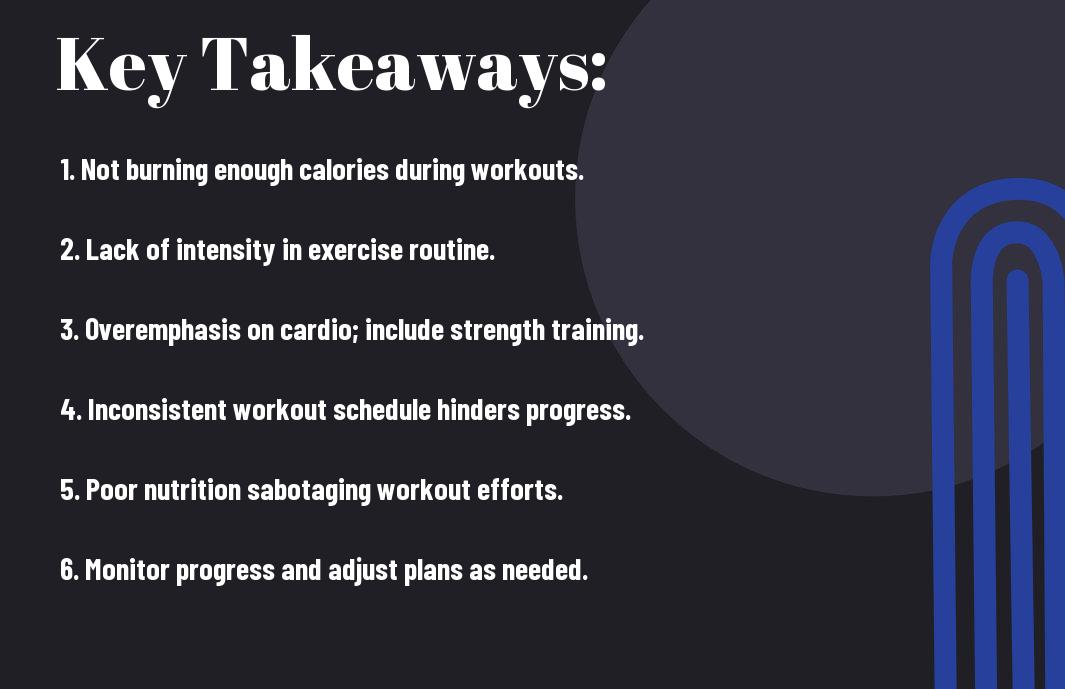Workout routines often feel like they’re falling flat, and you might be wondering why your efforts aren’t translating into weight loss. The truth is that many individuals unknowingly engage in ineffective practices that hinder their progress. Understanding these common pitfalls and how to address them can transform your fitness journey. In this blog post, you’ll discover the reasons behind your stagnant results and practical strategies to revitalize your workouts, ensuring you reach your weight loss goals efficiently and effectively.

Key Takeaways:
- Exercise Intensity: Your workout might not be challenging enough; increasing the intensity can help boost calorie burn.
- Nutrition Alignment: Weight loss is heavily influenced by diet; ensure your nutrition supports your fitness goals.
- Consistency Matters: A regular, structured routine is crucial; consistency in both workouts and nutrition leads to better results.

Understanding Weight Loss
To effectively lose weight, it’s crucial to grasp the principles that govern this process. Weight loss is fundamentally about balancing the number of calories you consume with the calories you expend. By understanding these principles, you can tailor your exercise and eating habits to create a sustainable and productive weight loss plan that aligns with your goals.
The Science of Caloric Deficit
By creating a caloric deficit—burning more calories than you consume—you ignite the weight loss process. Achieving this deficit can be done by reducing calorie intake, increasing physical activity, or combining both. It’s crucial to track your progress and adjust your habits accordingly, ensuring that your body continues to burn fat effectively.
Common Misconceptions About Weight Loss
To navigate your weight loss journey successfully, it’s important to sift through common misconceptions. Many people believe that simply exercising more or drastically cutting calories is the answer. However, understanding the nuances of weight loss can lead to more effective strategies that contribute to sustainable results.
Science shows that misconceptions about weight loss often stem from misleading information and oversimplified guidelines. Some think that all calories are equal or that carbohydrates should be eliminated entirely. Others may believe that intense workouts alone are the key to shedding pounds. In truth, holistic approaches that include balanced nutrition, consistent exercise, and healthy lifestyle choices work best for long-term success. By addressing these misconceptions, you can create a more informed strategy tailored to your needs.
Identifying Ineffective Workouts
Now that you’ve committed to your fitness journey, it’s imperative to identify whether your current workout regimen is actually helping you achieve your weight loss goals. You might be following popular routines but still not seeing results. Understanding the reasons behind ineffective workouts can open the door to more effective strategies that will support your weight loss journey.
Lack of Progress Tracking
Beside ensuring that your workouts are effective, keeping track of your progress is vital for staying motivated and informed. If you aren’t logging your workouts and results, it becomes difficult to assess what’s working and what’s not. (Make it a priority to regularly record your progress to fine-tune your routine.)
Overemphasis on Cardio
Overemphasis on cardio can lead you away from incorporating strength training and other forms of exercise that are beneficial for weight loss. While cardio does burn calories, relying solely on it can neglect muscle building, which helps boost your metabolism. (Consider diversifying your routine to include strength training and high-intensity workouts for a well-rounded approach.)
With an intense focus on cardio, you may overlook the significant advantages that come from including strength training in your workouts. Resistance exercises build muscle mass, which in turn increases your resting metabolic rate, allowing you to burn more calories even at rest. By balancing your routine with both cardio and strength training, you can maximize your weight loss results. (Evaluating and adjusting your workout to include a variety of training methods can lead to better outcomes.)
The Role of Nutrition in Weight Loss
Keep in mind that weight loss is not solely about the number of calories burned during workouts; it’s equally influenced by your nutrition. A well-balanced diet provides the important nutrients your body needs to function optimally and supports your workout efforts. (Prioritizing nutrition can significantly enhance your weight loss journey.)
Importance of a Balanced Diet
The foundation of effective weight loss lies in maintaining a balanced diet. By incorporating a variety of food groups, you ensure your body receives the vitamins, minerals, and macronutrients it requires. Focusing on whole foods rather than processed options will help stabilize your energy levels and support effective workouts, leading to improved weight loss results.
Common Dietary Mistakes
Dietary mistakes can easily sabotage your weight loss goals. Skipping meals, relying on fad diets, or underestimating portion sizes often lead to a cycle of overeating and weight gain. These habits disrupt your metabolism and prevent you from maximizing the benefits of your workouts.
Importance of mindfulness in your eating habits cannot be overstated. You must pay attention to what you consume, ensuring that your meals are rich in nutrients and portions are appropriate for your energy expenditure. Be aware of emotional eating, which often stems from stress rather than hunger, and replace unhealthy snacks with wholesome alternatives that support your weight loss efforts.
Incorporating Strength Training
Once again, it’s important to evaluate your workout routine in light of strength training. Many people overlook this element, focusing solely on cardio exercises. Incorporating resistance training into your regimen can significantly enhance your weight loss journey by building muscle, which in turn boosts your metabolism. (Make the decision to prioritize strength training in your workouts for lasting results.)
Benefits of Resistance Training
Between increased muscle mass and an elevated metabolic rate, resistance training offers numerous benefits that aid in weight loss. It helps you build lean muscle, which not only shapes your body but also helps to burn more calories at rest. Additionally, strength training improves your overall strength and functionality, making daily activities easier and more enjoyable.
Creating a Balanced Workout Plan
Any effective workout plan should integrate strength training, cardiovascular exercise, and flexibility work to truly maximize results. A balanced routine not only keeps things enjoyable, it addresses all aspects of fitness, allowing for optimal weight loss and muscle gain.
Understanding the components of a balanced workout plan is key. Aim to include strength training at least two to three times a week, alongside cardiovascular activities and flexibility training. Consider varying your exercises to target different muscle groups, and allocate recovery days to allow your body to repair and grow. This comprehensive approach will ensure you stay motivated, avoid plateaus, and reach your weight loss goals efficiently.
Adjusting Workout Intensity
Many individuals underestimate the importance of workout intensity in their weight loss journey. If your current routine feels too easy or fails to challenge you, it might be time to reevaluate. Elevating the intensity can push your body into a more effective fat-burning state, maximizing weight loss results and optimizing your efforts in the gym.
Understanding Heart Rate Zones
Intensity plays a vital role in effective weight loss, and understanding your heart rate zones can help you train smarter. By identifying your personal training zones—ranging from light to maximum effort—you can tailor your workouts for optimal fat burning, improving cardiovascular health and endurance.
Progressive Overload Techniques
After establishing your intensity levels, incorporating progressive overload techniques is imperative for continued progress. This approach involves gradually increasing the weight, duration, or difficulty of your workouts to challenge your muscles and prevent plateaus. (You must continuously assess your workouts to ensure you’re progressing.)
Zones are integral in implementing progressive overload, as they allow you to keep track of your performance and adapt accordingly. By increasing intensity within your heart rate zones, you can stimulate muscle growth and improve overall fitness. (Regularly updating your training plan according to these techniques is vital for consistent improvement.)
Lifestyle Factors Affecting Weight Loss
Unlike what many believe, weight loss is not solely about the exercises you do; lifestyle factors play a significant role. Here are some key elements to consider:
- Sleep quality and duration
- Stress levels and management
- Nutrition choices
- Hydration habits
This means that adjusting these aspects of your day-to-day life can enhance your weight loss journey.
The Impact of Sleep
Impact on weight loss is significant when it comes to sleep. Poor sleep can disrupt hormones that regulate hunger, leading to increased cravings and weight gain. (Prioritize at least 7-9 hours of quality sleep each night.)
Managing Stress for Better Results
Any high-stress levels can hinder your weight loss progress by elevating cortisol, a hormone associated with fat retention. Effectively managing stress through techniques such as mindfulness or exercise is necessary. (Find a stress-relief method that works for you and incorporate it into your routine.)
Weight management is often easily affected by your emotional state and how you cope with stress. Building a consistent stress-management strategy will not only benefit your mental health but will also support your weight loss goals. (Take actionable steps to nurture your mental well-being daily.)
To wrap up
Taking this into account, understanding why your current workout isn’t yielding the weight loss results you desire is vital for making effective changes. You may need to reassess your workout intensity, frequency, or even incorporate strength training if you’re focusing solely on cardio. Additionally, ensure your nutrition supports your fitness efforts. By analyzing these factors and adjusting your regimen, you can unlock your body’s potential for weight loss and achieve your goals more efficiently.
Q: Why am I not losing weight despite working out regularly?
A: There are several factors that might be affecting your weight loss despite maintaining a regular workout routine. One possibility is that your diet may not align with your weight loss goals. It’s vital to ensure that you are consuming fewer calories than you burn. Additionally, the type of workouts you are doing may not be suitable for your body type or fitness level. Consider incorporating a mix of high-intensity interval training (HIIT) and strength training to boost your metabolism. Lastly, insufficient recovery time can lead to fatigue, impacting your workout effectiveness. Evaluating your workout routine and possibly consulting a fitness professional can help in identifying the necessary adjustments.
Q: Is it possible that I’m gaining muscle instead of losing weight?
A: Yes, it’s entirely possible to gain muscle while losing fat, which can sometimes make the scale seem misleading. Muscle is denser than fat; thus, you might not see significant changes in your weight even as your body composition improves. To track progress accurately, consider using body measurements, how your clothes fit, or body fat percentage assessments rather than focusing solely on the number on the scale. If your goal is weight loss, you may want to evaluate your nutrition plan alongside your workout regime, as a balanced diet rich in protein can support muscle growth while facilitating fat loss.
Q: How can I make my workouts more effective for weight loss?
A: To enhance the effectiveness of your workouts for weight loss, consider diversifying your exercise routine to challenge your body in different ways. Incorporate a combination of cardiovascular exercises, strength training, and flexibility workouts to keep your metabolism engaged. Additionally, increasing the intensity of your workouts or including interval training can maximize calorie burn. Setting specific fitness goals, such as increasing the weights you lift or the duration of your cardio sessions, can also provide motivation. Lastly, ensure you are fueling your body properly before and after workouts to optimize performance and recovery.










Reply